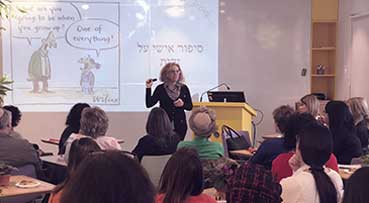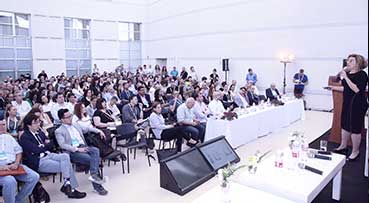So, you’ve graduated and are ready to take your first real job! You’re probably realizing that there is no direct line between what you’ve studied in college and the prerequisites for entry level jobs available in the market. It’s not easy to find a job with no prior experience. And even if you find one, you’re likely to discover that the junior jobs are a world away from your dream job. Moreover, the salary is far from what you imagined after all those years invested in education. You feel demotivated and upset, facing the famous “chicken and egg” dilemma: all first jobs require experience, but how do I get the experience without that first job?
No worries! Your career success will not depend on the title or on the description of your first job. You do control the important aspects of those first few years, those that will help you to define your future career path!
For starters, in this changing world around us, your profession will likely not look the same in five years. And in ten years it is possible that it will no longer exist. We live in an era where our knowledge ages so fast that we constantly need to change both the “what” and the “how” of our work. So, the title of your first job doesn’t matter. What matters is that the capabilities and experience that you will be acquiring as you do that job can contribute to the wealth of transferable skills that you will be able to apply in any job you will hold in the future.
Seven strategies that will help you get the most out of your first job:
- Sorry, you’re not done learning. At this stage you need to create as much value for yourselves as you do for the organization. That’s why I recommend you start working at a place that will have the resources to invest into your development. It can be a large corporation with resources for employee development or a great manager that can serve as your mentor. So instead of searching for a job, I suggest you look for a place that will enable your training, growth, development, and onboarding into a new career. Also, be mindful that you don’t fall into the trap of routine. Be strategic, plan ahead, and allocate time, attention, resources and budget to keep learning, all the time. Feedback from your direct boss and from your teammates will also be a valuable resource for your professional and personal growth – don’t miss out on this valuable opportunity and ask for feedback on a regular basis. Feedback is good for you.
- Be a Junior, think like a Senior – as you build your career it is necessary, yet insufficient to simply do your job. In any workplace, you have unlimited opportunities to respond to changes affecting either the content or the process of doing your job. For example, you can strive to better understand the data and learn to provide answers for questions no one even thought to ask. Or you may decide to focus on providing the best service possible, become a dream team-mate and extend your helping hand to anyone who may benefit from your skills or knowledge, even outside of your core team and day job. At the start of my career, my manager advised me: When someone asks you for data, always ask “why?”, and based on the answer – don’t just supply the data, provide your analysis as well. This same manager also told me to freely share information without being worried that someone else may receive credit for the job done. At the end of the day, people know who does what and who provides value.
- What don’t I know that I don’t know? – Learn to think outside the box, beyond your job, organization, industry. Always be open minded to new approaches, tools, research, techniques and learn from industry leaders. Remember that your career is based both on your current and your future responsibilities, so you need to be ready. Learning is not only about one course or one professor. You need to ensure that you are constantly developing a diverse set of skills. Go and volunteer in areas different from your day job, ask for more complex tasks, look for opportunities to work in bigger teams or even in global teams; get exposed to new cultures and new organizations, and new management styles. You can find such opportunities in your current organization or elsewhere: in NGOs, through community work or through a hobby. All these activities will enrich your experience and will help you understand how the world around you is changing and how you need to continue adjusting to keep up with this constant change.
- To be cutting edge or not to be – You cannot ignore technology. Even if your job is not technological, technology will become more and more prevalent in your day-to-day work through new tools and systems. You need to be able to work with, for, and through technology. So, it’s important to be proactive and proficient. Even if technology has no direct relation to your job, it’s essential to learn and adapt in order to stay relevant and maybe ahead of the competition. Sometimes this means just becoming familiar with new technologies, sometimes – it means using more information or using subject experts’ knowledge to understand how certain technologies work so you can use them better. Be sure you stay up to date even if that’s not the culture of your current environment.
- Friends are not only on LinkedIn – in today’s world who you know matters sometimes even more than what you know. Sometimes it is faster to get to the right answer if you know someone who knows someone who knows what you need to know. Always proactively search for interesting people – whether it’s at work, industry events, social circles, or clubs – and reach out. I know a young employee who made a tradition of “Tuesday lunch” – a set day of the week when he, instead of having a regular lunch with his teammates, takes the time to have lunch with someone he doesn’t know or hasn’t seen in a long time to connect and exchange ideas. Find yourself a mentor, whether for a specific activity or just for regular career conversations. People really matter in your career. When the environment changes, they will help you identify and understand the new situation. They will open new doors for you and will help you with connections. In our interconnected world you need to develop the ability to create and maintain different types of relationships.
- Your personal brand – first, be aware that you have a personal brand. It is the impression that you leave on others with every word or action, through everything that you do and say and everything that you choose not to do and not to say. This impression creates the image others have about you and about the value that you bring. At the end of the day, this image will define when you’ll get invited to a new project or activity, and when a new important connection will be introduced to you – and when it won’t. It’s not that complicated. When you want to work with someone for a specific task, you don’t think of their CV – you think of why you actually want to work with this specific person. For example, because this person is known to ask good questions or because they know how to research a complex topic. So why would someone want to bring you onboard? What is that value that you bring? Remember that your personal brand is also reflected online, especially in our global and hybrid world. It includes the way you participate in professional forums and social networks. Be aware of the results Google search returns when one looks up your name.
- Where should I fail this week? – Your ability to be resilient, recover from failures quickly, and cope with uncertainty are critical for your ability to succeed in our fast world. Don’t get confused by all the success stories you hear all around. Most of our day-to-day lives are filled with routine tasks, trial and error. You are learning now, and if everything you do succeeds – it probably indicates that you don’t challenge yourself enough. So, get out there, explore what you can do and collect failures as diamonds on the crown of your career experience. First, because it means that you tried, took risks, and took on more than what you could handle and, in the process, you learned valuable lessons. And that you’ve made mistakes you won’t make again. More than anything it will help you prepare for all the future challenges, and you will be more flexible and adaptable when the right change or opportunity comes. It is flexibility that will help you make the right step even in times of uncertainty.
These strategies will help you throughout your career. They will help you keep your skills and capabilities relevant and will open new doors and opportunities! Remember: your career success is not based on your profession, your job description or even your employer, no matter how great they are. Your future career success depends on your ability to stay relevant in the job market. And that depends only on you!

![large-AX1A2125-2[1] large-AX1A2125-2[1]](https://niritcohen.com/wp-content/uploads/elementor/thumbs/large-AX1A2125-21-pnzedcs72atx5aeurqytqdiihxixlq02re9mlz805s.jpg)






